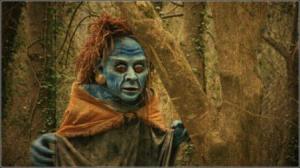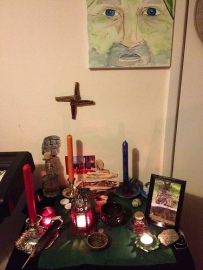Disclaimer: This post is about my experiences. I sometimes have difficulty communicating the idea that I’m talking about *me* alone, and not trying to universalize any of my ideas. But this post is just about me. Me me me. Got that? Good. :P
.
I’m a polytheist. I actually believe that the gods exist. Really and truly, and outside of our minds, and everything.
Why yes, I am that naive. ;)
I haven’t met many people who have quite as a literal a view of the gods as I do (though I have met some). And it would be easy to put it all down to my background — except that my view of my gods today is very different from the way I used to see the Christian god. He was never as personal to me as my Pagan gods are today. Don’t get me wrong, I believed in him very strongly – but as a very abstract force.
In contrast, the Gaelic gods are very real spirits to me. To some extent they’re the forces of nature and/or the tribe, but they’re also individuals. Explaining my theology there would take far more words than is sensible in a blog post. But basically, that’s how they represent themselves to me. (And I value my eyebrows too much to tell a god that I think they’re wrong about that!)
But I’m nervous about talking about my gods with anyone else, hence the disclaimer. I’m really scared that people will think I’m dismissing the way that they experience the gods. Not true. I have the greatest respect for everyone’s experiences of Spirit, of the Divine. There have been a lot of blog posts knocking around the internet recently on the subject of the gods in Paganism, with many polytheists arguing that Pagan pantheists and humanists don’t take the gods seriously enough. In my very personal opinion, that’s crap. My way of understanding the gods does not have to be everyone else’s way. There’s a rich tapestry of belief out there. As the mystics said, god is the Light that is so bright it is as darkness to us.[2] And if each of us is given a different glimpse of an edge of that Light, then I can surely learn so much from the rainbow of others’ perspectives.
So what does this polytheism mean for me? Well, for one thing, it doesn’t mean I take the myths literally. I don’t think Lugh actually knocked on the door of the Hall of Tara and told the gatekeeper about all the things he could do. I think the story says something about how my ancestors understood Lugh, as a powerful god who does all things well, with other tales revealing other ways that he was experienced. They met the gods in stories, and in stories they brought them back to this world. I think I’m a little bit in love with that approach. My ancestors weren’t idiots who took things too literally and could only conceive of people-shaped gods. They were much more subtle than that.
In a way, I met some of these gods a long time ago — I was fascinated by Irish myth growing up. I bought books of it whenever I went to Ireland, and I tried to find many of the places talked about in the myths. But of course, I didn’t know them as individuals until much later. Brighid and the Morrigan turned up in a meditation very early on in my Pagan journey – they arrived together, initially as the symbols of the Crow and the Well. They’ve been a bit of a ‘team’ for me ever since – they encourage and support my social justice work, and my resistance to oppression in my own life, but in very different ways. I mainly relate to Brighid as a hearth goddess, as someone who sends me out from the darkness into the world, and who protects my home. I think she’s experienced very differently by different people.
And then there are the gods who are more land-focused, for me. Manannan mac Lir is strongly present in the part of Ireland where my family lives, by the sea — as is Cailleach Bhearra (who, interestingly, is known as his wife in local folklore), although I didn’t meet her until quite recently. Some Gaelic scholars talk about how there are two pantheons reflected in Celtic myths[3], and I think it is possible to see tribal deities as separate from the remnants of a potentially-older pantheon of the forces of the land (who may in some way overlap with the Fomorii). There’s something of that in my experience. I like having the balance between the two – gods of chaos, gods of order.
As for Lugh, I was asking for his help for practical things a lot, and I thought it was only fair to give him a shrine, if I was going to keep calling on him. Among other things, I have a beautiful red wineglass with harvest symbols on it (found in a charity shop), where I occasionally leave offerings. I get the sense that he’s a very business-like god — he likes to get on with things. (In my experience.) Meanwhile, I think of Ogma as a sort of patron of my studies, and although I don’t talk to him much, the tiny shelf shrine seemed appropriate when I started working with the Ogham.
There’s only one god I (sometimes) honour who is not Gaelic, at the moment: Arianrhod. Other cultures’ gods are mostly still a mystery to me. I particularly can’t get my head around the Norse gods. I think at some point I’ll attempt to immerse myself in Norse mythology and see if I can at least begin to figure them out.
But here’s where it gets complicated. I also honour St. Catherine of Alexandria regularly, and other saints less regularly. She is not a goddess – she’s my patron saint. She made herself known to me some years ago, at my confirmation (which is why I took her name as a confirmation name), and she’s been happy to stick around – which is ironic, but hey ho. She’s also one of the most complicated saints I could have ended up with, what with the themes of pagan and Christian non-co-operation in her story. I work with other saints, too. I’m not entirely sure how to categorise them in relation to my Paganism, but I’m increasingly thinking I don’t need to worry about it. I’ve been reading that wonderful book The Fairy Faith in Celtic Countries, where an interviewee says that the Irish called on the saints faithfully to start with, then moved on to petitioning fairies and pagan gods if necessary. My somewhat ad-hoc approach is nothing very new. As needs must, and all that.
And then there are spirits who cross the ancestor-deity border in some way… and the other gods who have turned up from time to time… and this post is getting far too long, so I’m going to stop here.
This has been my act of Courage for the week!
.
[1]See http://www.thisisirishfilm.ie/shorts/an-cailleach-bheara – a wonderful animated short film based on the myths of Cailleach Bhearra.
[2]This is apophatic theology, which posits that the Divine can only be expressed in negative terms, ultimately because it’s beyond our understanding.
[3]Alexei Kondratiev in ‘Land, Sea and Sky‘



Thanks for sharing your views on your personal deities. It can be a tricky matter as pagan views, both on the nature of deity and who and what they work with are so varied. And yes, some people do get the wrong end of the stick and think you are laying claims to absolute truth, when really you just want to share what’s true for you.
It’s interesting what you said about myth. I do tend to take myths literally, as real events the gods were involved in, as a basic starting point, then examine them from a number of other angles- historical and social, analogic and symbolic- to elucidate the meaning for myself in a number of different ways. It’s also interesting to reflect on how the gods and their stories have changed since the myth took place.
Another thought provoking post :)
Ooh yes, looking at how myths have developed through history, and other cultural evidence for beliefs in gods, is really interesting from that standpoint. I love starting with the Indo-European stuff and working from that towards the most recent ideas, as well as looking at variations in the myths. It all makes up the tapestry of what was understood about the gods, and why. :)
It is often assumed that if one believes in the gods as literally independent beings, one must also interpret the myths literally. I never understood this reasoning. In any case, I hope the tensions between polytheists and pagan naturalists are soon put to rest for I feel quite at home in both camps. I suppose I could be called an agnostic polytheist, though that doesn’t sound quite right. I believe in the existence of the gods, I am just not sure in what way they exist.
Agnostic polytheist is a great term! I think I’m probably a polytheist aspiring-mystic :D
Most (culturally Christian) agnostics I know don’t do ritual, don’t talk to their god(s), do not make offerings or dream of them. But in a ‘literal sense’ it is ture. ;)
Polytheist aspiring-mystic is certainly more poetic.
Great post! I enjoyed reading about your experiences with Deity. For me personally, I don’t feel as if I know the Gods and Goddesses well enough yet to say what I believe, though I tend to see them as individual entities and all of that. It’s also interesting what you said about the Norse Deities. I work with the Norse Deities in my own personal practice, so drop me a line if you want to chat about Them! :)
Blessings,
Victoria
Pingback: 30 Days of Paganism, 3 – Beliefs: Deities | Léithin Cluan